- Home
- Carl Sagan
The Dragons of Eden
The Dragons of Eden Read online
THE DRAGONS OF EDEN
33 Weeks on The New York Times
Bestseller List
Carl Sagan is a very special scientist! He’s that teacher you always wish you had—and his book, The Dragons of Eden, is a masterpiece of instructive entertainment!
“Carl Sagan has the Midas touch. Any subject he deals with turns to gold, and so it is in The Dragons of Eden. Never have I read anything on the subject of human intelligence as fascinating and as charming.”
ISAAC ASIMOV
“Provocative … Entertaining … Impressive … Even those of us who are not heavyweight thinkers will wish to pillow our craniums a bit more carefully at night after reading Sagan. He makes you realize that the gray mass between your ears is quite a treasure.”
Chicago Daily News
“Not all great thinkers are scientists, and not all scientists are great thinkers, but Sagan—young, zealous and imaginative—is both … THE DRAGONS OF EDEN…is really quite super.”
Philadelphia Inquirer
“Daring speculations and great fun … He argues for the worth and dignity of other species, even unknown species. If the alien creatures should ever touch down here, Sagan is one of those who would get a call in the middle of the night.”
The Baltimore Sun
“Extraordinary! … Exciting! … Sagan’s perspective ranges from the emergence of life on earth four billion years ago to the limitless possibilities for expanding human intelligence … A masterpiece of scientific writing for non-scientists.”
Chicago Tribune
“Absorbing … fascinating … The man writes clearly and well and often with humor … explaining, probing and relating with grace the story of the human brain.”
Associated Press
“Marvelous! … There are rewards of many sorts in this provocative book!”
The Wall Street Journal
“A joy! … A Carl Sagan is … a gifted and charismatic figure … he has become the idol of a whole generation of students.”
The Washington Post Book World
“In some lost Eden where dragons ruled, the foundations of our intelligence and passions were laid … Carl Sagan takes us on a guided tour of that lost land … Fascinating … Entertaining … Masterful!”
St. Louis Post-Dispatch
By Carl Sagan
Published by Ballantine Books:
BROCA’S BRAIN
COSMOS
THE DRAGONS OF EDEN
MURMURS OF EARTH
SHADOWS OF FORGOTTEN ANCESTORS
(with Ann Druyan)
COMET
(with Ann Druyan)
PALE BLUE DOT
THE DEMON-HAUNTED WORLD
BILLIONS AND BILLIONS
A Ballantine Book
Published by The Random House Publishing Group
Copyright © 1977 by Carl Sagan
All rights reserved.
Published in the United States by Ballantine Books, an imprint of The Random House Publishing Group, a division of Random House, Inc., New York, and simultaneously in Canada by Random House of Canada Limited, Toronto.
Ballantine and colophon are registered trademarks of Random House, Inc.
www.ballantinebooks.com
Library of Congress Catalog Card Number: 76-53472
eISBN: 978-0-307-80100-5
This edition published by arrangement with Random House, Inc.
v3.1
PERMISSION ACKNOWLEDGMENTS
CHAPTER OPENINGS, this page and this page: Courtesy of The Escher Foundation—Haags Gemeentemuseum—The Hague. This page and this page: From “The Great Ravelled Knot” by George W. Gray, Scientific American, October 1948, pp. 32–33. Copyright © 1948 by Scientific American, Inc. All rights reserved. This page: From The Journal of Cell Biology, Volume 26, pp. 365–381, Figure 1 (1965). Reproduced by copyright permission of Rockefeller University and Dr. Elizabeth Gantt. This page: Reprinted by permission of Science News: The Weekly News Magazine of Science. Copyright © 1976 by Science Service Inc. This page: From “Effects of Focal Brain Injury on Human Behavior” by Hans-Lukas Teuber on page 462 of The Nervous System, Volume 2: The Clinical Neurosciences, edited by Donald B. Tower (New York: Raven Press, 1975). Reprinted by permission of the publisher. This page: From p. 60 of Mankind in the Making, revised edition by William Howells, drawings by Janis Cirulis. Copyright © 1959, 1967 by William Howells. Reproduced by permission of Doubleday and Company, Inc. This page: LIFE NATURE LIBRARY, Early Man, by F. Clark Howell and the Editors of TIME-LIFE Books, drawings by Jay H. Matternes. Copyright © 1965, 1973 Time, Inc. Reprinted by permission. Photograph by Henry B. Beville. This page: From Not From the Apes, by Björn Kurtén. Copyright © 1972 by Björn Kurtén. Reprinted by permission of Pantheon Books, a Division of Random House, Inc. This page and this page: Courtesy of Dr. Beatrice and Dr. Robert Gardner, Department of Psychology, The University of Nevada, Reno. This page and this page: From “Reading and Sentence Completion by a Chimpanzee,” by Duane M. Rumbaugh et al., Science, November 16, 1974, Volume 182, pp. 731–733, Figures 1 and 2. Copyright © 1973 by the American Association for the Advancement of Science. Reprinted by permission of the publisher and Dr. D. M. Rumbaugh. This page: Photograph courtesy of Dr. fames Maas, Department of Psychology, Cornell University, Ithaca, New York. Slide #7, Slide Group for General Psychology, Set 2; published by McGraw-Hill, Inc., 1974. This page: From “A New Specimen of Stenonychosaurus from the Oldman Formation (Cretaceous) of Alberta” by Dale A. Russell. Reproduced by permission of the National Research Council of Canada from the Canadian Journal of Earth Sciences, Volume 6, pp. 595–612; 1969. This page: From a mural by Charles R. Knight. Courtesy of The Field Museum of Natural History, Chicago. Reprinted by permission. This page: From “The Split Brain in Man” by Michael S. Gazzaniga, Scientific American, August 1967, Volume 217, #2, page 26. Copyright © 1967 by Scientific American, Inc. All rights reserved. This page and this page: From “Perception in the Absence of the Neocortical Commissures” by R. W. Sperry, pp. 126, 129, in Perception and Its Disorders, Proceedings of the Association for Research in Nervous and Mental Disease, December 6 and 7, 1968, Volume 48. Copyright © 1968 by the Association for Research in Nervous and Mental Disease. Reprinted by permission of the publisher. This page: Originally published in Neuropsychologia, Volume 9, pp. 247–259. Copyright © 1971 by Pergamon Press, Inc. Reprinted by permission of Pergamon Press. This page: From “The Split Brain in Man” by Michael S. Gazzaniga, Scientific American, August 1967, Volume 217, #2, page 28. Reprinted by permission of the author. This page: LIFE NATURE LIBRARY, Early Man, by F. Clark Howell and the Editors of TIME-LIFE books, drawings by Jay H. Metternes. Copyright © 1965, 1973 Time, Inc. Reprinted by permission. Photograph by Henry B. Beville. This page: From The Conscious Brain by Steven Rose. Copyright © 1973 by Steven Rose. Reprinted by permission of Alfred A. Knopf, Inc. this page and this page: Photographs courtesy of the Computer Graphics Department, Cornell University. This page: Photograph courtesy of MOTOROLA Semiconductor Products, Inc.
Mankind is poised midway between the gods and the beasts.
PLOTINUS
The main conclusion arrived at in this work, namely, that man is descended from some lowly-organized form, will, I regret to think, be highly distasteful to many persons. But there can hardly be a doubt that we are descended from barbarians. The astonishment which I felt on first seeing a party of Fuegians on a wild and broken shore will never be forgotten by me, for the reflection at once rushed into my mind—such were our ancestors. These men were absolutely naked and bedaubed with paint, their long hair was tangled, their mouths frothed in excitement, and their expression was wild, startled, and distrustful. They possessed hardly any arts, and, like wild animals, lived on what th
ey could catch; they had no government, and were merciless to everyone not of their own small tribe. He who has seen a savage in his native land will not feel much shame, if forced to acknowledge that the blood of some more humble creature flows in his veins. For my own part, I would as soon be descended from that heroic little monkey, who braved his dreaded enemy in order to save the life of his keeper; or from that old baboon who, descending from the mountains, carried away in triumph his young comrade from a crowd of astonished dogs—as from a savage who delights to torture his enemies, offers up bloody sacrifices, practices infanticide without remorse, treats his wives like slaves, knows no decency, and is haunted by the grossest superstitions.
Man may be excused for feeling some pride at having risen, though not through his own exertions, to the very summit of the organic scale; and the fact of his having thus risen, instead of having been aboriginally placed there, may give him hopes for a still higher destiny in the distant future. But we are not here concerned with hopes or fears, only with the truth as far as our reason allows us to discover it. I have given the evidence to the best of my ability; and we must acknowledge, as it seems to me, that man with all his noble qualities, with sympathy which feels for the most debased, with benevolence which extends not only to other men but to the humblest living creature, with his godlike intellect which has penetrated into the movements and constitution of the solar system—with all these exalted powers—Man still bears in his bodily frame the indelible stamp of his lowly origin.
CHARLES DARWIN
The Descent of Man
I am a brother to dragons, and a companion to owls.
Job 30:29
Contents
Cover
Other Books by This Author
Title Page
Copyright
Permission Acknowledgments
Introduction
1
The Cosmic Calendar
2
Genes and Brains
3
The Brain and the Chariot
4
Eden as a Metaphor: The Evolution of Man
5
The Abstractions of Beasts
6
Tales of Dim Eden
7
Lovers and Madmen
8
The Future Evolution of the Brain
9
Knowledge is Our Destiny: Terrestrial
and Extraterrestrial Intelligence
Acknowledgments
Bibliography
Glossary
Introduction
In good speaking, should not the mind of the speaker know the truth of the matter about which he is to speak?
PLATO
Phaedrus
I do not know where to find in any literature, whether ancient or modern, any adequate account of that nature with which I am acquainted. Mythology comes nearest to it of any.
HENRY DAVID THOREAU
The Journal
ACOB BRONOWSKI was one of a small group of men and women in any age who find all of human knowledge—the arts and sciences, philosophy and psychology—interesting and accessible. He was not confined to a single discipline, but ranged over the entire panorama of human learning. His book and television series, The Ascent of Man, are a superb teaching tool and a remarkable memorial; they are, in a way, an account of how human beings and human brains grew up together.
His last chapter/episode, called “The Long Childhood,” describes the extended period of time—longer relative to our lifespan than for any other species—in which young humans are dependent on adults and exhibit immense plasticity—that is, the ability to learn from their environment and their culture. Most organisms on Earth depend on their genetic information, which is “prewired” into their nervous systems, to a much greater extent than they do on their extragenetic information, which is acquired during their lifetimes. For human beings, and indeed for all mammals, it is the other way around. While our behavior is still significantly controlled by our genetic inheritance, we have, through our brains, a much richer opportunity to blaze new behavioral and cultural pathways on short time scales. We have made a kind of bargain with nature: our children will be difficult to raise, but their capacity for new learning will greatly enhance the chances of survival of the human species. In addition, human beings have, in the most recent few tenths of a percent of our existence, invented not only extra-genetic but also extrasomatic knowledge: information stored outside our bodies, of which writing is the most notable example.
The time scale for evolutionary or genetic change is very long. A characteristic period for the emergence of one advanced species from another is perhaps a hundred thousand years; and very often the difference in behavior between closely related species—say, lions and tigers—do not seem very great. An example of recent evolution of organ systems in humans is our toes. The big toe plays an important function in balance while walking; the other toes have much less obvious utility. They are clearly evolved from fingerlike appendages for grasping and swinging, like those of arboreal apes and monkeys. This evolution constitutes a respecialization—the adaptation of an organ system originally evolved for one function to another and quite different function—which required about ten million years to emerge. (The feet of the mountain gorilla have undergone a similar although quite independent evolution.)
But today we do not have ten million years to wait for the next advance. We live in a time when our world is changing at an unprecedented rate. While the changes are largely of our own making, they cannot be ignored. We must adjust and adapt and control, or we perish.
Only an extragenetic learning system can possibly cope with the swiftly changing circumstances that our species faces. Thus the recent rapid evolution of human intelligence is not only the cause of but also the only conceivable solution to the many serious problems that beset us. A better understanding of the nature and evolution of human intelligence just possibly might help us to deal intelligently with our unknown and perilous future.
I am interested in the evolution of intelligence for another reason as well. We now have at our command, for the first time in human history, a powerful tool—the large radio telescope—which is capable of communication over immense interstellar distances. We are just beginning to employ it in a halting and tentative manner, but with a perceptibly increasing pace, to determine whether other civilizations on unimaginably distant and exotic worlds may be sending radio messages to us. Both the existence of those other civilizations and the nature of the messages they may be sending depend on the universality of the process of evolution of intelligence that has occurred on Earth. Conceivably, some hints or insights helpful in the quest for extraterrestrial intelligence might be derived from an investigation of the evolution of terrestrial intelligence.
I was pleased and honored to deliver the first Jacob Bronowski Memorial Lecture in Natural Philosophy in November 1975, at the University of Toronto. In writing this book, I have expanded substantially the scope of that lecture, and have been in return provided with an exhilarating opportunity to learn something about subjects in which I am not expert. I found irresistible the temptation to synthesize some of what I learned into a coherent picture, and to tender some hypotheses on the nature and evolution of human intelligence that may be novel, or that at least have not been widely discussed.
The subject is a difficult one. While I have formal training in biology, and have worked for many years on the origin and early evolution of life, I have little formal education in, for example, the anatomy and physiology of the brain. Accordingly, I proffer the following ideas with a substantial degree of trepidation; I know very well that many of them are speculative and can be proved or disproved only on the anvil of experiment. At the very least, this inquiry has provided me with an opportunity to look into an entrancing subject; perhaps my remarks will stimulate others to look more deeply.
The great principle of biology—the one that, as far as we know, distinguishes the biological from t
he physical sciences—is evolution by natural selection, the brilliant discovery of Charles Darwin and Alfred Russel Wallace in the middle of the nineteenth century.* It is through natural selection, the preferential survival and replication of organisms that are by accident better adapted to their environments, that the elegance and beauty of contemporary life forms have emerged. The development of an organ system as complex as the brain must be inextricably tied to the earlier history of life, its fits and starts and dead ends, the tortuous adaptation of organisms to conditions that change once again, leaving the life form that once was supremely adapted again in danger of extinction. Evolution is adventitious and not foresighted. Only through the deaths of an immense number of slightly maladapted organisms are we, brains and all, here today.
Biology is more like history than it is like physics; the accidents and errors and lucky happenstances of the past powerfully prefigure the present. In approaching as difficult a biological problem as the nature and evolution of human intelligence, it seems to me at least prudent to give substantial weight to arguments derived from the evolution of the brain.
My fundamental premise about the brain is that its workings—what we sometimes call “mind”—are a consequence of its anatomy and physiology, and nothing more. “Mind” may be a consequence of the action of the components of the brain severally or collectively. Some processes may be a function of the brain as a whole. A few students of the subject seem to have concluded that, because they have been unable to isolate and localize all higher brain functions, no future generation of neuroanatomists will be able to achieve this objective. But absence of evidence is not evidence of absence. The entire recent history of biology shows that we are, to a remarkable degree, the results of the interactions of an extremely complex array of molecules; and the aspect of biology that was once considered its holy of holies, the nature of the genetic material, has now been fundamentally understood in terms of the chemistry of its constituent nucleic acids, DNA and RNA, and their operational agents, the proteins. There are many instances in science, and particularly in biology, where those closest to the intricacies of the subject have a more highly developed (and ultimately erroneous) sense of its intractability than those at some remove. On the other hand, those at too great a distance may, I am well aware, mistake ignorance for perspective. At any rate, both because of the clear trend in the recent history of biology and because there is not a shred of evidence to suport it, I will not in these pages entertain any hypotheses on what used to be called the mind-body dualism, the idea that inhabiting the matter of the body is something made of quite different stuff, called mind.

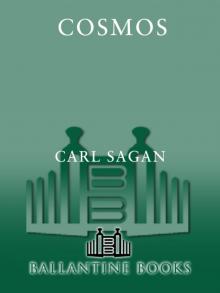 Cosmos
Cosmos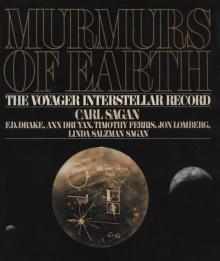 Murmurs of Earth
Murmurs of Earth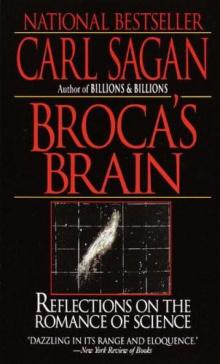 Broca's Brain
Broca's Brain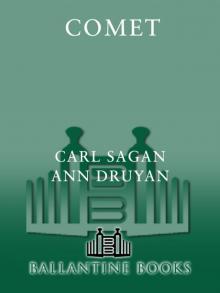 Comet
Comet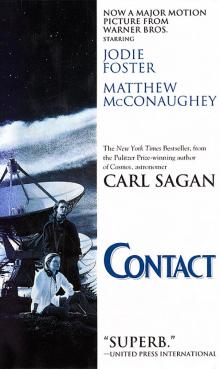 Contact
Contact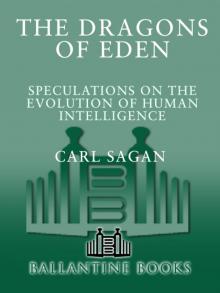 Dragons of Eden
Dragons of Eden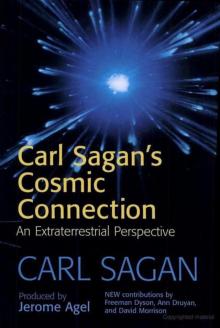 Cosmic Connection
Cosmic Connection Shadows of Forgotten Ancestors
Shadows of Forgotten Ancestors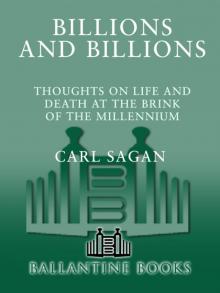 Billions & Billions
Billions & Billions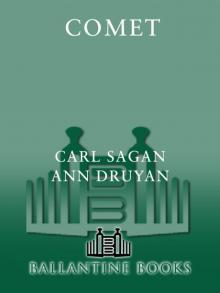 Comet, Revised
Comet, Revised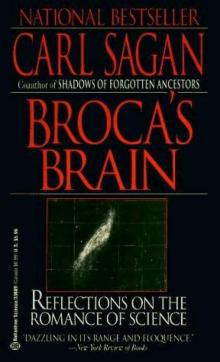 Broca's Brain: The Romance of Science
Broca's Brain: The Romance of Science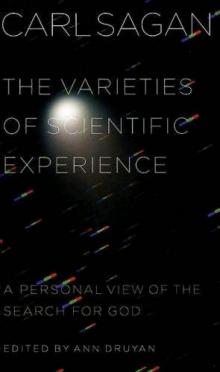 The Varieties of Scientific Experience: A Personal View of the Search for God
The Varieties of Scientific Experience: A Personal View of the Search for God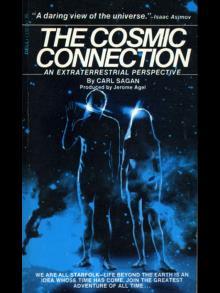 The Cosmic Connection
The Cosmic Connection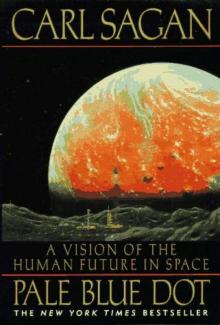 Pale Blue Dot: A Vision of the Human Future in Space
Pale Blue Dot: A Vision of the Human Future in Space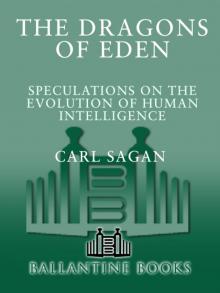 The Dragons of Eden
The Dragons of Eden